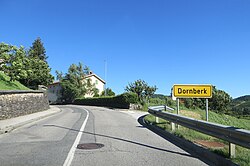Dornberk
 From Wikipedia - Reading time: 8 min
From Wikipedia - Reading time: 8 min
Dornberk
Zali Hrib (1952–1955) | |
|---|---|
 | |
| Coordinates: 45°53′21.08″N 13°44′9″E / 45.8891889°N 13.73583°E | |
| Country | |
| Traditional region | Slovenian Littoral |
| Statistical region | Gorizia |
| Municipality | Nova Gorica |
| Area | |
• Total | 1.08 km2 (0.42 sq mi) |
| Elevation | 60.7 m (199.1 ft) |
| Population (2002) | |
• Total | 795 |
| [1] | |
Dornberk (pronounced [ˈdoːɾnbɛɾk]; Italian: Montespino) is a village in western Slovenia in the Municipality of Nova Gorica.[2] It is located in the Vipava Valley within the Goriška region of the Slovenian Littoral. Dornberk is the centre of a local community that includes the satellite settlements of Potok pri Dornberku, Saksid, Brdo, Tabor, Draga, Zalošče, and Budihni. The entire local community has a population of around 1,800.
Name
[edit]
The Slovene name of the village comes from German Dornberg, meaning 'thorn hill'. This was also the official name until the end of World War I, when the village came under Italian administration. At first, the Italians used a historical version of the traditional name of the village, Dorimbergo,[3] but during the Fascist period the name was changed to Montespino, which is a literal Italian translation of the German name. After World War II, the village briefly reacquired its old name, but in 1952 the name was changed again because of its German sound, and the name Zali Hrib (literally, 'bad hill')[4] was invented.[5] The locals rejected the new designation and demanded the old name back. The name of the settlement was changed to Dornberg in 1955, and later the final -g was replaced with a -k.[6][7] Nevertheless, the locals still refer to it as Dornberg rather than Dornberk. This phonetic difference is not perceived in the nominative case in standard Slovene, in which the final voiced velar stop /g/ is pronounced as voiceless /k/. However, in the local Karst dialect spoken in the lower Vipava Valley, /g/ has developed into the voiced glottal fricative /ɦ/, and often a voiceless glottal fricative at the end of words.
Economy
[edit]The Dornberk area is known for the production of wine and fruits, especially peaches, apricots, and pears.
Church
[edit]
The parish church in the settlement is dedicated to the Prophet Daniel and belongs to the Diocese of Koper.[8]
See also
[edit]References
[edit]- ^ Statistical Office of the Republic of Slovenia
- ^ Nova Gorica municipal site
- ^ Dorimbergo in Udine illustrata, part I, of Giovanni Capidogli (1665): "La Famiglia da Rabatta è di nobiltà isquisita, ed immemorabile; onde fino da Enrico Terzo Re de' Romani fu degnamente presa in sua protezione, confermandole, ... donandole libere tante, e così ampie giurisdizioni nella Toscana, che formavano un considerabile, e non picciolo Stato. Non avendo poi la fortuna con pregresso di tempo per li molti, e vari accidenti di guerra, ripigliati quei beni, che prima le aveva concesso, si ricoverò la suddetta Famiglia nella Repubblica Fiorentina, nella quale fu tenuta, e pregiata delle più nobili, conseguendo in quella tutti li principali maneggi ec. Indi per le fazioni de' Guelfi, e Ghibellini passò nel Friuli, e prese posto in Udine già Quattrocento, e più anni ed avendo più tempo quivi dimorando godendo della Signoria di tre Castella, si condusse finalmente nel Contado di Gorizza, dove poscia ottenne in Feudo il Castello di Dorimbergo con altre giurisdizioni, che oggidì parimenti si conservano nella medesima Famiglia" in: Istoria del Decamerone di Giovanni Boccaccio scritta da Domenico Maria Manni Accademico fiorentino, in Firenze MDCCXXXXII (1742)
- ^ Snoj, Marko (2009). Etimološki slovar slovenskih zemljepisnih imen. Ljubljana: Modrijan. p. 119.
- ^ "Zakon o razdelitvi Ljudska republike Slovenije na mesta, okraje in občine". Uradni list Ljudske republike Slovenije. 9 (11): 50. April 19, 1952. Retrieved March 20, 2022.
- ^ "Uredba o preimenovanju naselij, o dopolnitvi imena takih naselij, ki imajo enako se glaseča imena in o drugih popravkih imena naselij". Uradni list Ljudske republike Slovenije. 12 (21): 394. June 9, 1955. Retrieved March 20, 2022.
- ^ "Archived copy". Archived from the original on 2022-12-09. Retrieved 2022-03-20.
{{cite web}}: CS1 maint: archived copy as title (link) - ^ Roman Catholic Diocese of Koper List of Churches May 2008 Archived March 6, 2009, at the Wayback Machine
External links
[edit] Media related to Dornberk at Wikimedia Commons
Media related to Dornberk at Wikimedia Commons- Dornberk on Geopedia
 KSF
KSF
